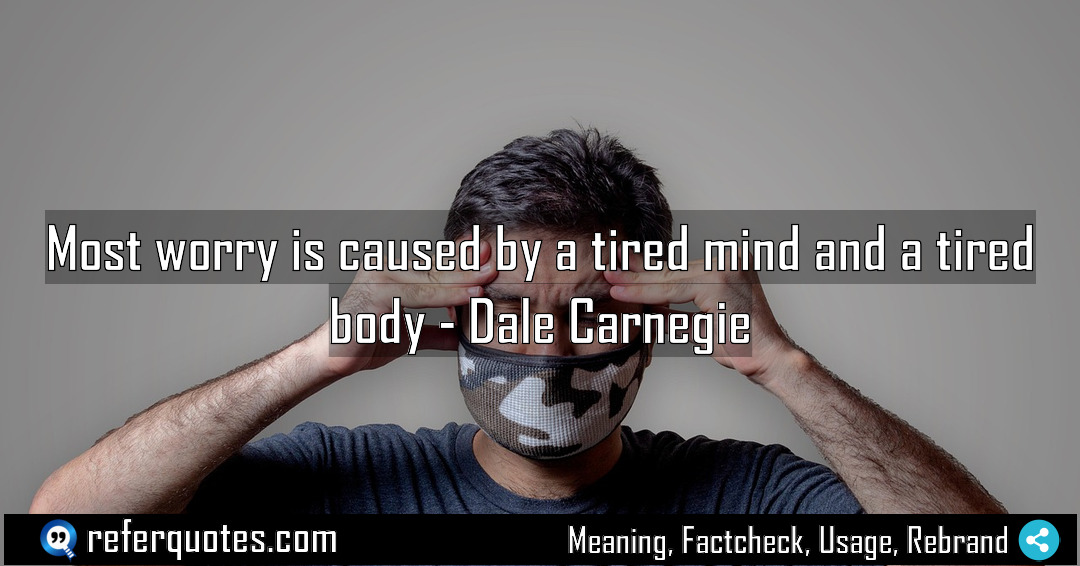
Most worry is caused by a tired mind… It’s a simple but profound truth that reframes anxiety not as a logical problem, but as a physical and mental state.
Share Image Quote:
Table of Contents
Meaning
At its core, this quote means that what we often label as “worry” is frequently just the brain’s foggy, distorted interpretation of simple exhaustion. It’s a symptom, not the root cause.
Explanation
Let me break this down for you. For years, I used to think my late-night anxiety spirals were about deep, unsolvable life problems. Then I started applying this. I realized that at 2 AM, after a brutal day, my mind isn’t a reliable narrator. It’s a tired processor running on empty, and it starts generating catastrophic scenarios because it literally lacks the energy to think clearly. It’s not that the problems aren’t real; it’s that a weary brain can’t solve them. It can only catastrophize them. The solution, then, isn’t more thinking. It’s rest.
Quote Summary
Reading Level43
Aesthetic Score54
Origin & Factcheck
This is straight from Dale Carnegie’s 1948 classic, How to Stop Worrying and Start Living. It’s a cornerstone of his practical philosophy. You’ll sometimes see similar sentiments floating around the internet unattributed, but this specific, powerful phrasing is Carnegie’s.
Attribution Summary
Author Bio
Dale Carnegie(1888), an American writer received worldwide recognition for his influential books on relationship, leadership, and public speaking. His books and courses focus on human relations, and self confidence as the foundation for success. Among his timeless classics, the Dale Carnegie book list includes How to Win Friends and Influence People is the most influential which inspires millions even today for professional growth.
Official Website |Facebook | X | Instagram | YouTube |
Where is this quotation located?
| Quotation | Most worry is caused by a tired mind and a tired body |
| Book Details | Publication Year/Date: 1948 (first edition)
ISBN/Unique Identifier: 9780671035976 (widely available reprint)
Last edition. Number of pages: Common Pocket/Simon & Schuster reprints ~352–464 pages (varies by printing) |
| Where is it? | Section How to Avoid Fatigue, Unverified – Edition 1948, page range ~234–246 |
Context
In the book, this idea isn’t presented in a vacuum. It’s part of a larger rule: “Rest before you get tired.” Carnegie was building a case for preventative maintenance of your mental energy, arguing that you can’t solve problems effectively from a depleted state. It was a radical, almost mechanical view of human worry for its time.
Usage Examples
So, how do you actually use this? It’s a game-changer in a few key situations.
- For the Overworked Professional: When you’re staring at a spreadsheet at 10 PM and everything feels like a disaster, ask yourself: “Am I dealing with a genuine crisis, or am I just completely spent?” 9 times out of 10, the most productive next step is to shut the laptop and go to sleep. The solution will look different, clearer, in the morning.
- For the Stressed Parent: When the kids are finally in bed and you’re left with a racing mind about all your shortcomings, recognize that “mom/dad guilt” is amplified a thousandfold by pure physical and emotional exhaustion. The worry isn’t a true reflection of your performance.
- For the Creative Stuck in a Loop: If you’ve been grinding on a project for hours and the ideas have stopped flowing, that’s not a creative block—it’s fatigue. The mind is tired. Step away. Take a walk. The breakthrough won’t come from forcing it.
To whom it appeals?
Share This Quote Image & Motivate
Motivation Score52
Popularity Score60
Shareability Score42
Common Questions
Question: So, are you saying all worry is meaningless and I should just ignore it?
Answer: Not at all. I’m saying you need to qualify it. Use this as a filter. Before you engage with a worry, check your fuel gauge. If you’re running on empty, table the discussion with yourself until you’ve rested. Legitimate concerns will still be there, but you’ll be equipped to handle them.
Question: What if I’m tired all the time? Does that mean my constant anxiety is just fatigue?
Answer: This is a crucial point. If you’re in a state of chronic exhaustion, then yes, your anxiety is likely being fueled by it. This quote becomes a diagnostic tool. It points you toward addressing the root cause—your fatigue—rather than just wrestling with the symptom, which is the worry.
Question: How is this different from just “sleeping on it”?
Answer: It’s the why behind the “sleep on it” advice. Most people think sleeping on it works magically. Carnegie gives us the mechanism: it works because you are reversing the very condition—a tired mind and body—that was causing the distorted, worried thinking in the first place. It’s not magic; it’s physiology and psychology.
Similar Quotes
You know that feeling when you’re lying in bed, mind racing, and you think “If I don’t fall asleep, I’ll be wrecked tomorrow”? Dale Carnegie nailed it with “If you…
You know, I’ve found that “The quickest way to defeat worry is to pray” is less about religion and more about a powerful mental shift. It’s a tool for immediate…
Our fatigue is often caused not by work… it’s a game-changer. This isn’t about sleep; it’s about the mental drain from worry and frustration that we mistake for physical exhaustion.…
You know, that idea that a lack of sleep will erode your optimism… it’s not just a feeling, it’s a biological fact. Once you understand the mechanics, it changes how…
